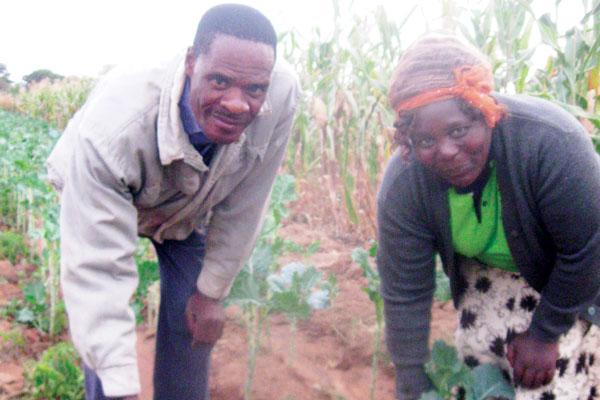
Forty-six-year-old Agnes Chida has no regrets that she and her husband relocated from Harare to the rural outskirts of Hurungwe in 2014 to preach the gospel.
BY NHAU MANGIRAZI

Although many who migrate to rural outposts often struggle to access clean and potable water, with infrastructure like boreholes having broken down and wells running dry, this has not been the case.
“We have enjoyed a good life as we are assured of clean water anytime of the day as long as there is wind, which is natural. Water is readily available and we have an all-year round irrigation facility for our garden, maize field and chicken run,” she said.
About 100m from her home is a windmill borehole drilled in 1996 by the Methodist Church of Zimbabwe, which has brought hope to the rural community.
The windmill borehole is situated a few metres from the main tarred road linking Magunje and Zvipani under headman Matawu in Chief Dandawa’s area.
The water point is used by all the members in the community, including schoolchildren and has become a daily haven of activity for villagers who prefer to get water there compared to other boreholes.
Nearly 200 households and their livestock are benefitting from the borehole which was set up as part of a renewable energy programme and has become key in sustaining livelihoods through provision of water for domestic use and irrigation.
- Chamisa under fire over US$120K donation
- Mavhunga puts DeMbare into Chibuku quarterfinals
- Pension funds bet on Cabora Bassa oilfields
- Councils defy govt fire tender directive
Keep Reading
Chida and her husband, Shepard, are preachers in Methodist Church and the couple has two children.
They live at Chivakanenyama rural outpost situated about 60km west of Karoi.
“Even people who pass through here on their way either to Nyaminyami or Gokwe, get water here for free,” Chida said.
Chivakanenyama Primary School, one of the oldest schools in Hurungwe built by missionaries in 1952 and Chikavanenyama Secondary School built in 1966, have also benefited from the development.
Currently there are over 700 pupils at the primary school with over 300 students at the secondary school, according to teachers who are a stone’s throw away from the church.
Chida explained that the windmill borehole pumps water into three tanks: a 5 000l tank near the windmill borehole a few metres from the couple’s house, while another 10 000l tank is a feeder to their house and the third 5 000l is for irrigating their two-acre plot.
“We are mostly likely to have green maize in August as we are preparing the fields,” she said, adding that their orchard — with mangoes, bananas and guavas — was also flourishing due to the abundance of water.
Her husband explained that the windmill borehole was built through an initiative by a former reverend, Webster, who sourced equipment and was installed in 1996 bringing relief to the community.
Joyce Zata (53) of Ruzende village, about 3km away, said they are at ease getting water at the windmill borehole.
“Unlike some areas where the water is contaminated as people share with animals from unprotected sources, the windmill borehole has been a good solution for us,” Zata, who has been living here since 1990, said.
Theresa Mapara of Murimbika village concurred saying women in the community had been hugely relieved, as they can now do their chores at the windmill borehole without challenges.
“Naturally we get water for free and it has been good for us,” the 36-year-old mother of three said.
Headman Chigango, however, expressed concern over unruly elements that had vandalised the borehole.
“Our main challenge is that some members of the community have vandalised the windmill of late and since a church is a non-profit organisation, it affects everyone,” Chigango said.
Chida admitted that this was their biggest challenge as some community members did not appreciate the significance of the infrastructure.
“Some people don’t understand community ownership in the true sense and we have to endure such challenges sometimes. Someone stripped the facility of bolts and we had to seek donations to have it repaired,” she said.
Hurungwe rural district ward 25 councillor, Lovemore Mushawashi, said the availability of water to the communities proves that the some of the rural folk may achieve Sustainable Development Goal (SDG) number 6 that looks at provision of clean water and sanitation.
SDG6 calls on policymakers to ensure availability and sustainable management of water and sanitation for all by 2030.
“We may be facing challenges about water and sanitation for our communities but the windmill borehole has proven that it can be easily through natural resources and clean energy,” Mushawashi said.











